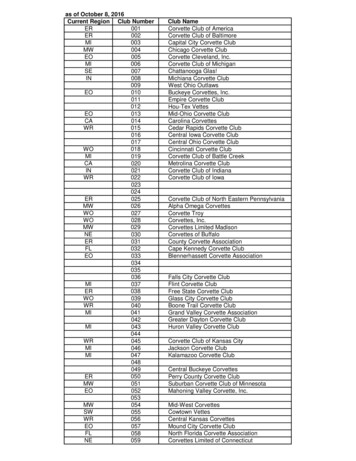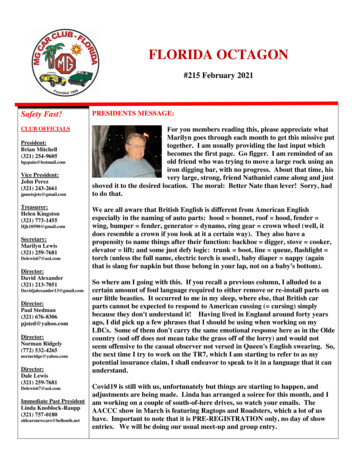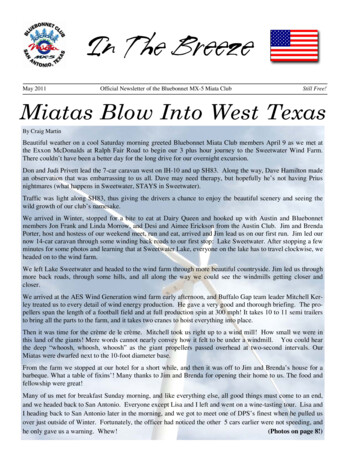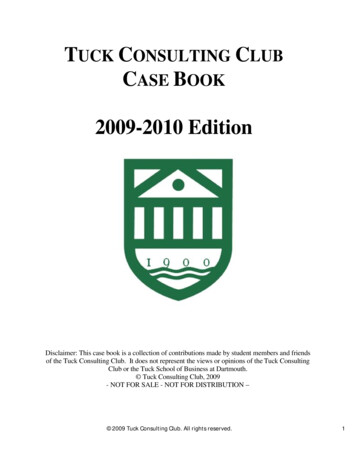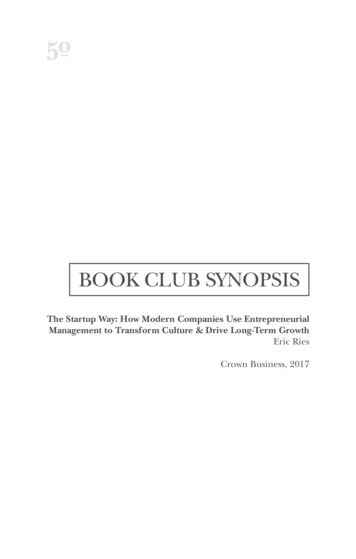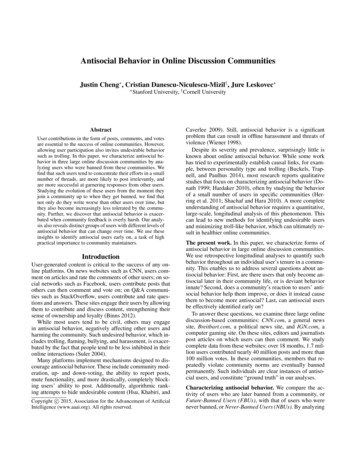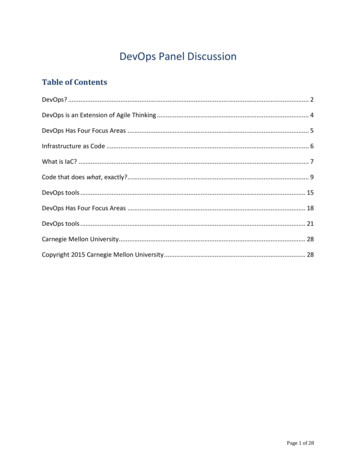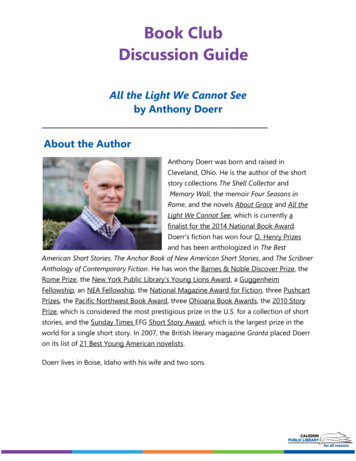
Transcription
Book ClubDiscussion GuideAll the Light We Cannot Seeby Anthony DoerrAbout the AuthorAnthony Doerr was born and raised inCleveland, Ohio. He is the author of the shortstory collections The Shell Collector andMemory Wall, the memoir Four Seasons inRome, and the novels About Grace and All theLight We Cannot See, which is currently afinalist for the 2014 National Book Award.Doerr’s fiction has won four O. Henry Prizesand has been anthologized in The BestAmerican Short Stories, The Anchor Book of New American Short Stories, and The ScribnerAnthology of Contemporary Fiction. He has won the Barnes & Noble Discover Prize, theRome Prize, the New York Public Library’s Young Lions Award, a GuggenheimFellowship, an NEA Fellowship, the National Magazine Award for Fiction, three PushcartPrizes, the Pacific Northwest Book Award, three Ohioana Book Awards, the 2010 StoryPrize, which is considered the most prestigious prize in the U.S. for a collection of shortstories, and the Sunday Times EFG Short Story Award, which is the largest prize in theworld for a single short story. In 2007, the British literary magazine Granta placed Doerron its list of 21 Best Young American novelists.Doerr lives in Boise, Idaho with his wife and two sons.
Book ClubDiscussion GuideAll the Light We Cannot Seeby Anthony DoerrAbout the BookFrom the highly acclaimed, multiple award-winning Anthony Doerr, a stunninglyambitious and beautiful novel about a blind French girl and a German boy whosepaths collide in occupied France as both try to survive the devastation of World WarII.Marie-Laure lives with her father in Paris near the Museum of Natural History, wherehe works as the master of its thousands of locks. When she is six, Marie-Laure goesblind and her father builds a perfect miniature of their neighborhood so she canmemorize it by touch and navigate her way home.When she is twelve, the Nazis occupy Paris and father and daughter flee to thewalled citadel of Saint-Malo, where Marie-Laure’s reclusive great-uncle lives in a tallhouse by the sea. With them they carry what might be the museum’s most valuableand dangerous jewel.In a mining town in Germany, the orphan Werner grows up with his younger sister,enchanted by a crude radio they find. Werner becomes an expert at building andfixing these crucial new instruments, a talent that wins him a place at a brutalacademy for Hitler Youth, then a special assignment to track the resistance. Moreand more aware of the human cost of his intelligence, Werner travels through theheart of the war and, finally, into Saint-Malo, where his story and Marie-Laure’sconverge.Ten years in the writing, All the Light We Cannot See is a magnificent, deeply movingnovel from a writer, says the Los Angeles Times, "whose sentences never fail to thrill."
Book ClubDiscussion GuideAll the Light We Cannot Seeby Anthony DoerrDiscussion Questions* Note that these questions reveal much of the novel’s plot; to preserve your readingpleasure, please don’t look at these questions until after you’ve finished reading thebook.The book opens with two epigraphs. How do these quotes set the scene for the rest ofthe book? Discuss how the radio plays a major part in the story and the time period.How do you think the impact of the radio back then compares with the impact of theInternet on today’s society?2. The narration moves back and forth both in time and between different characters.How did this affect your reading experience? How do you think the experience wouldhave been different if the story had been told entirely in chronological order?3. Whose story did you enjoy the most? Was there any character you wanted moreinsight into?4. When Werner and Jutta first hear the Frenchman on the radio, he concludes hisbroadcast by saying “Open your eyes and see what you can with them before they closeforever” (pages 48–49), and Werner recalls these words throughout the book (pages 86,264, and 409). How do you think this phrase relates to the overall message of the story?How does it relate to Madame Manec’s question: “Don’t you want to be alive before youdie?” (page 270)?5. On page 160, Marie-Laure realizes “This.is the basis of his fear, all fear. That a lightyou are powerless to stop will turn on you and usher a bullet to its mark.” How does thisimage constitute the most general basis of all fear? Do you agree?
Book ClubDiscussion Guide6. Reread Madame Manec’s boiling frog analogy on page 284. Etienne later asks MarieLaure, “Who was supposed to be the frog? Her? Or the Germans?” (page 328) Who didyou think Madame Manec meant? Could it have been someone other than herself or theGermans? What does it say about Etienne that he doesn’t consider himself to be thefrog?7. On page 368, Werner thinks, “That is how things are.with everybody in this unit, inthis army, in this world, they do as they’re told, they get scared, they move about withonly themselves in mind. Name me someone who does not.” But in fact many of thecharacters show great courage and selflessness throughout the story in some way, bigor small. Talk about the different ways they put themselves at risk in order to do whatthey think is right. What do you think were some shining moments? Who did youadmire most?8. On page 390, the author writes, “To shut your eyes is to guess nothing of blindness.”What did you learn or realize about blindness through Marie-Laure’s perspective? Doyou think her being blind gave her any advantages?9. One of Werner’s bravest moments is when he confronts von Rumpel: “All your life youwait, and then it finally comes, and are you ready?” (page 465) Have you ever had amoment like that? Were you ready? What would you say that moment is for some of theother characters?10. Why do you think Marie-Laure gave Werner the little iron key? Why might Wernerhave gone back for the wooden house but left the Sea of Flames?11. Von Rumpel seemed to believe in the power of the Sea of Flames, but was it truly asupernatural object or was it merely a gemstone at the center of coincidence? Do youthink it brought any protection to Marie-Laure and/or bad luck to those she loved?12. When Werner and Marie-Laure discuss the unknown fate of Captain Nemo at theend of Twenty Thousand Leagues Under the Sea, Marie-Laure suggests the openendedness is intentional and meant to make us wonder (page 472). Are there anyunanswered questions from this story that you think are meant to make us wonder?
Book ClubDiscussion Guide13. The 1970s image of Jutta is one of a woman deeply guilt-ridden and self-consciousabout her identity as a German. Why do you think she feels so much guilt over thecrimes of others? Can you relate to this? Do you think she should feel any shame abouther identity?14. What do you think of the author’s decision to flash forward at the end of the book?Did you like getting a peek into the future of some of these characters? Did anythingsurprise you?15. Aleksandr Solzhenitsyn once wrote that “the line dividing good and evil cuts throughthe heart of every human being.” All the Light We Cannot See is filled with examples ofhuman nature at its best and worst. Discuss the themes of good versus evil throughoutthe story. How do they drive each other? What do you think are the ultimate lessonsthat these characters and the resolution of their stories teach us?
Book ClubDiscussion GuideAll the Light We Cannot Seeby Anthony DoerrReviews[O]nce I started reading.All the Light We Cannot See, there was no putting itdown. The fact is [it] falls shortest when it tries to deal with Nazism. Mostpreposterous of all is a certain Sgt. Maj. Reinhold von Rumpel, whosewickedness and physical loathsomeness are offset by nothing that could makehim into a rounded character. His unbelievability exemplifies a mistake writersoften make when describing monsters. All the Light We Cannot See is morethan a thriller and less than great literature. “a good read.” Maybe Doerr couldwrite great literature if he really tried. I would be happy if he did.William T. Vollmann - New York Times Book ReviewIncandescent Mellifluous and unhurried Characters as noble as they areenthralling. Doerr looms myriad strains into a luminous work of strife andtranscendence.Hamilton Cain - Oprah MagazineIntricately structured All the Light We Cannot See is a work of art and ofpreservation.Jane Ciabattari - BBC(Starred review.) If a book’s success can be measured by its ability to movereaders and the number of memorable characters it has, Story Prize–winnerDoerr’s novel triumphs on both counts. Along the way, he convinces readersthat new stories can still be told about this well-trod period, and that war—despite its desperation, cruelty, and harrowing moral choices—cannot negatethe pleasures of the world.Publishers Weekly
Book ClubDiscussion Guide(Starred review.) Shifting among multiple viewpoints but focusing mostly onblind French teenager Marie-Laure and Werner, a brilliant German soldier., thisnovel has the physical and emotional heft of a masterpiece. The mainprotagonists are brave, sensitive, and intellectually curious, and in another timethey might have been a couple. [H]ighly recommended. —Evelyn Beck,Piedmont Technical Coll., Greenwood, SCLibrary JournalEndlessly bold and equally delicate An intricate miracle of invention, narrativeverve, and deep research lightly held, but above all a miracle ofhumanity .Anthony Doerr’s novel celebrates—and also accomplishes—whatonly the finest art can: the power to create, reveal, and augment experience inall its horror and wonder, heartbreak and rapture.Shelf Awareness(Starred review.) A novel to live in, learn from, and feel bereft over when thelast page is turned, Doerr’s magnificently drawn story seems at once spaciousand tightly composed. Doerr masterfully and knowledgeably recreates thedeprived civilian conditions of war-torn France and the strictly controlled lives ofthe military occupiers.Booklist(Starred review.) Doerr presents us with two intricate stories, both of whichtake place during World War II; late in the novel, inevitably, they intersect.Doerr captures the sights and sounds of wartime and focuses, refreshingly, onthe innate goodness of his major characters.Kirkus Reviews
All the Light We Cannot See by Anthony Doerr _ About the Author Anthony Doerr was born and raised in Cleveland, Ohio. He is the author of the short story collections The Shell Collector and Memory Wall, the memoir Four Seasons in Rome, and the novels About Grace and A


